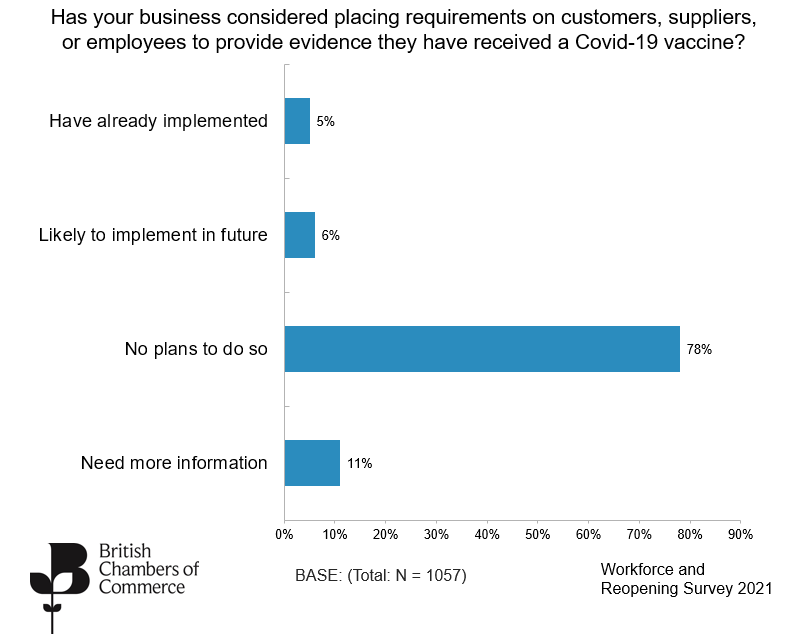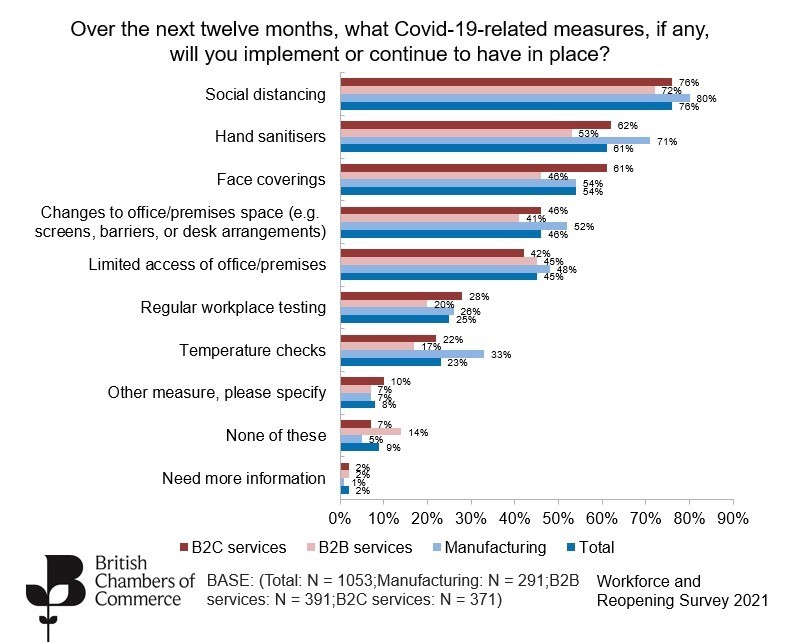78% of Businesses Report No Plans to Implement ‘Vaccine Certification’, Survey Shows
78% of Businesses Report No Plans to Implement ‘Vaccine Certification’, Survey Shows
– A survey of more than 1,000 UK businesses carried out by the BCC shows that only 5% of firms have already implemented their own requirements for proof of vaccination
– Firms with more than 50 staff were more likely than smaller firms to either have implemented or be considering introducing requirements for proof of vaccination, but nearly 7 in 10 (69%) still have no plans to do so
– More than 3 in 4 companies (76%) also expect to keep social distancing in place over the next year, 54% said the same of face coverings
The British Chambers of Commerce today published new survey data which show that the vast majority of responding businesses have no plans in place to require evidence of vaccination from customers, suppliers or employees. The BCC has therefore called on the Government to set out plans as soon as possible for what operating conditions will be for businesses after the final phase of the roadmap so that businesses can plan effectively.
The data, from a survey of more than 1,000 businesses across a variety of sectors and based in all parts of the UK, also shows that social distancing and hand sanitising are the Covid-19 measures firms were most likely to expect to continue to have in place over the next 12 months.
When asked whether their business had any plans to require proof of vaccination from customers, suppliers or employees – 78% of respondents said they had no plans to do so. 5% said they had already implemented such measures, 6% said they were likely to do so in the future and 11% said they needed more information.
Smaller firms were more likely than larger firms to have no plans to do so – with 80% of businesses with less than 50 staff giving this response. Only 4% of smaller firms said they already required proof vaccination and 6% said they were likely to in future.
For businesses with more than 50 staff, the proportion who had already implemented a requirement for proof of vaccination rose to 9%, with 8% saying they were likely to introduce it in the future and 13% saying they needed more information. However, 69% still said they had no plans at all to require proof of vaccination from customers, suppliers or employees.

When asked separately what Covid-19 measures they expected to have in place, or implement, over the next 12 months, the highest response was social distancing at 76%. 61% expected to have hand sanitiser available and over half, at 54%, expected face coverings to be a part of their measures. Only 9% of firms expected to have no measures at all in place over the next 12 months.
Working practices seem set to continue to be disrupted, as 46% percent report the expectation of continued changes to their workspace, such as screens or socially distanced desk arrangements, and 45% report that they intend to limit access to their offices/premises.

Responding to the findings, Co-Executive Director of the British Chambers of Commerce, Hannah Essex, said:
“Businesses have worked hard to keep their customers and employees safe throughout the pandemic and will continue to do so. This research shows that government must quickly clarify what measures will be required for businesses to maintain safety standards after we reach the final stage of the roadmap on June 21st. In particular, they must resolve the ongoing debate around the use of vaccine certification, providing clear and decisive guidance to business.
“There has been a great deal of mixed signals on the issue of businesses being required to demand proof of vaccination from customers, suppliers or employees. Our figures show that as it stands the vast majority of firms have no plans in place for such a scenario. So, if government is indeed planning to make this a requirement in any sector, then it must act rapidly to inform businesses so that they can adjust and prepare.
"This research shows that government must quickly clarify what measures will be required for businesses to maintain safety standards."
“Right now, many businesses are working on the assumption that they will be continuing with a variety of Covid-secure measures over the next 12 months including social distancing, mask wearing and various other interventions. Many of these measures come at a cost to business and can restrict firms’ ability to trade at full capacity.
“Government must clearly set out when, and in what way, it will be safe to change these practises so that businesses can fully play their part in the economic recovery from the pandemic.”













